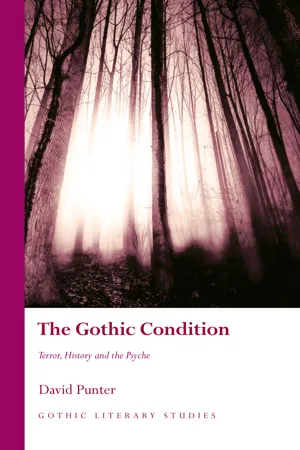![]()
Notes
1: Spectrality: The Ghosting of Theory
1Maurice Blanchot, The Space of Literature, trans. Ann Smock (Lincoln, NE, 1982), p. 194.
2Reproduced in Andrew Bennett and Nicholas Royle, An Introduction to Literature, Criticism and Theory (4th edn, Harlow, 2009), p. 160.
3See, e.g., various essays in Scott Brewster, John J. Joughin, David Owen and Richard J. Walker (eds), Inhuman Reflections: Thinking the Limits of the Human (Manchester, 2000). The cover illustration, perhaps unsurprisingly, is of Max Schreck as Dracula.
4See my Gothic Pathologies: The Text, the Body and the Law (London, 1998), e.g., pp. 14–15.
5Hamlet, I.v.77.
6See Chris Baldick and Robert Mighall, ‘Gothic Criticism’, in David Punter (ed.), A New Companion to the Gothic (Oxford, 2012), pp. 267–87.
7Punter, Gothic Pathologies, p. 14
8Peter Buse and Andrew Stott (eds), Ghosts: Deconstruction, Psychoanalysis, History (Basingstoke, 1999), p. 6.
9See Samuel Weber, The Legend of Freud (Minneapolis, 1982).
10Jacques Derrida, Specters of Marx: The State of the Debt, the Work of Mourning and the New International, trans. Peggy Kamuf (New York, 1994), p. 4.
11Sigmund Freud, Civilization and its Discontents (1930), in The Standard Edition of the Complete Psychological Works of Sigmund Freud, ed. James Strachey et al. (24 vols, London, 1953–74), XXI, p. 70.
12See Nicolas Abraham and Maria Torok, The Wolf Man’s Magic Word: A Cryptonymy, trans. Nicholas Rand (Minneapolis, 1986), e.g., p. 83.
13Nicholas Abraham and Maria Torok, The Shell and the Kernel: Renewals of Psychoanalysis, ed. Nicholas Rand (Chicago, 1994), p. 130.
14Abraham and Torok, The Shell and the Kernel, p. 173.
15The mention of ventriloquism can hardly fail to remind of one of the foundational Gothic texts, Charles Brockden Brown’s Wieland (1798).
16See Julia Kristeva, Strangers to Ourselves, trans. Leon Roudiez (New York, 1991).
17Jean Laplanche, Essays on Otherness, ed. John Fletcher (London, 1999), pp. 170–1.
18Philippa Berry and Andrew Wernick (eds), Shadow of Spirit: Postmodernism and Religion (London, 1992), pp. 2–4.
19See Christopher Bollas, The Shadow of the Object: Psychoanalysis of the Unthought Known (London, 1987).
20See my Postcolonial Imaginings: Fictions of a New World Order (Edinburgh, 2000), pp. 61ff.
21See Michael Taussig, Shamanism, Colonialism and the Wild Man: A Study in Terror and Healing (Chicago, 1987).
22Nicholas Royle, After Derrida (Manchester, 1995), p. 146.
23See Sigmund Freud, ‘The “Uncanny”’ (1919), in The Standard Edition of the Complete Psychological Works of Sigmund Freud, ed. James Strachey et al. (24 vols, London, 1953–74), XVII, p. 221.
24See Toni Morrison, Beloved (1987) and Arundhati Roy, The God of Small Things (1997).
25See Robert J. C. Young, ‘Deconstruction and the Postcolonial’, in Nicholas Royle (ed.), Deconstructions: A User’s Guide (Basingstoke, 2000), pp. 204–5.
26T. S. Eliot, Little Gidding, in Collected Poems, 1909–1962 (London, 1963), p. 217.
27See Homi Bhabha, ‘Of Mimicry and Man’, in The Location of Culture (London, 1994), pp. 85–92.
28See Jean Baudrillard, e.g., Revenge of the Crystal: Selected Writings on the Modern Object and its Destiny, 1968–1983, ed. Paul Foss and Julian Pefanis (London, 1990).
29Robert Smith, ‘Deconstruction and Film’, in Royle, Deconstructions, p. 121.
30Cf. Bret Easton Ellis, Glamorama (1998).
31William Gibson, Neuromancer (London, 1984), p. 180.
2: Francis Lathom in the Eighteenth Century
1See Jane Austen, Northanger Abbey, introd. Claudia L. Johnson (London, 1992), p. 40; Jane Austen’s Letters, ed. Deirdre Le Faye (new edn, Oxford and New York, 1995), p. 15.
2Devendra P. Varma, ‘I...

